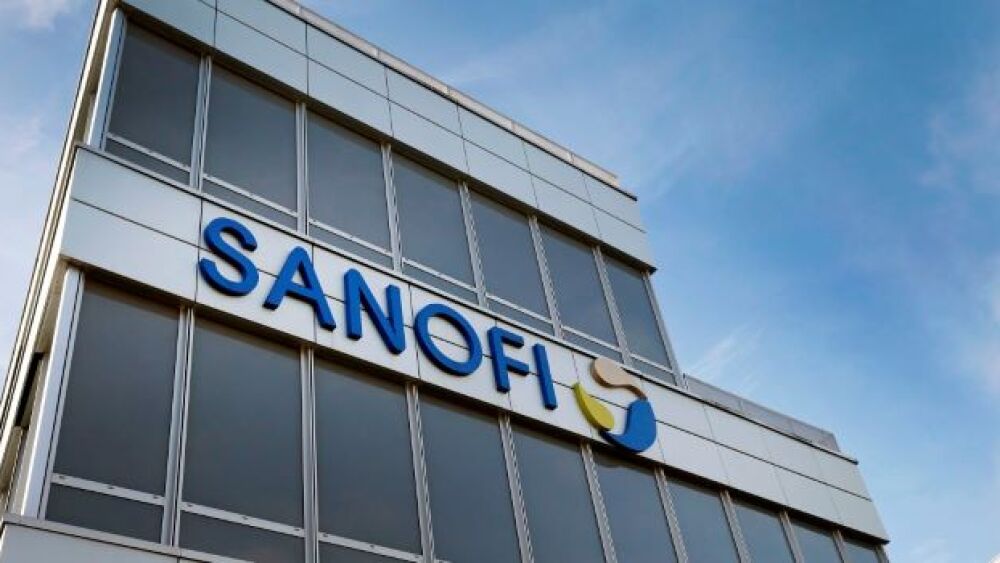Shares of Adagene Inc. are up more than 10% in premarket trading after the company announced a monoclonal and bispecific antibody collaboration with Sanofi valued at up to $2.5 billion.
Chesnot/Getty Images
Shares of Adagene Incorporated are up more than 10% in premarket trading after the company announced a monoclonal and bispecific antibody collaboration with Sanofi that is valued at up to $2.5 billion. The collaboration covers the potential development of four masked monoclonal and bispecific antibodies.
The partnership aims to harness the capabilities of Adagene’s SAFEbody technology, which is its proprietary antibody masking platform. SAFEbody is designed to allow an antibody to bind to its target in a specific manner following “conditional activation of the antibody in target tissues.” Essentially, the technology uses a masking technique that shields the binding domain of the therapy, allowing for tumor-specific targeting. Through this design, Adagene has sought to improve the safety and tolerability of antibody therapeutics while simultaneously maintaining clinical activity.
Adagene noted that its SAFEbody technology can be applied to various therapeutic modalities, including monoclonal and bispecific antibodies such as Fc empowered antibodies, antibody-drug conjugates and T-cell engagers. The company currently has five antibody-based candidates in IND-enabling studies and more than 50 more across different stages of discovery. ADG106, Adagene’s most advanced clinical program, is a first-in-class anti-CD137 monoclonal IgG4 antibody. It is currently being studied in a Phase I clinical trial in patients with advanced or metastatic solid and liquid tumors.
With SAFEbody, the companies intend to develop masked monoclonal and bispecific antibodies for oncology targets. The two companies did not specify what the targets were in their announcement. However, Valeria Fantin, Ph.D., Sanofi’s global head of oncology, noted that Adagene’s antibody platform should allow the company to “precisely target established, but poorly addressed oncology mechanisms with best-in-class medicines.” Fantin said Sanofi is “committed to chasing the miracle of science” and expressed excitement about the potential of the SAFEbody technology to design antibodies that can “bring transformative new medicines to people living with cancer.”
Under terms of the deal, Sanofi will make an upfront payment of $17.5 million to Adagene, a presence in both the United States and China. The partnership will first focus on two potential candidates for advancement and Sanofi has the option of bringing two more forward. Adagene will be responsible for the early-stage research activities to develop masked versions of Sanofi candidate antibodies. Sanofi will take over for later-stage development. As the assets move forward in the collaboration, Adagene will be responsible for significant development, regulatory and commercial milestone payments that add up to about $2.5 billion. If these antibodies are commercialized, Adagene will also be eligible to receive tiered royalties.
“We are at the forefront of pushing the boundaries of antibody discovery and engineering by leveraging our AI-powered technology platform. This enables dynamic and precise target engagement by our antibody-based therapeutics, which are tailor-made to overcome the fundamental challenges in oncology drug development today,” Peter Luo, Ph.D., co-founder, chairman and chief executive officer of Adagene, said in a statement.
Adagene has a long history of collaborations. The company has forged relationships with ADC Therapeutics, Celgene (now part of Bristol-Myers Squibb) and the National Institutes of Health. The deal with ADC Therapeutics also centers on Adagene’s SAFEbody technology to create a masked antibody that was expected to be combined with ADC Therapeutics’ pyrrolobenzodiazepine cytotoxic payload technology to create an antibody drug conjugate against cancer. Adagene also recently announced the achievement of a critical milestone in its SAFEbody collaboration with Exelixis.





